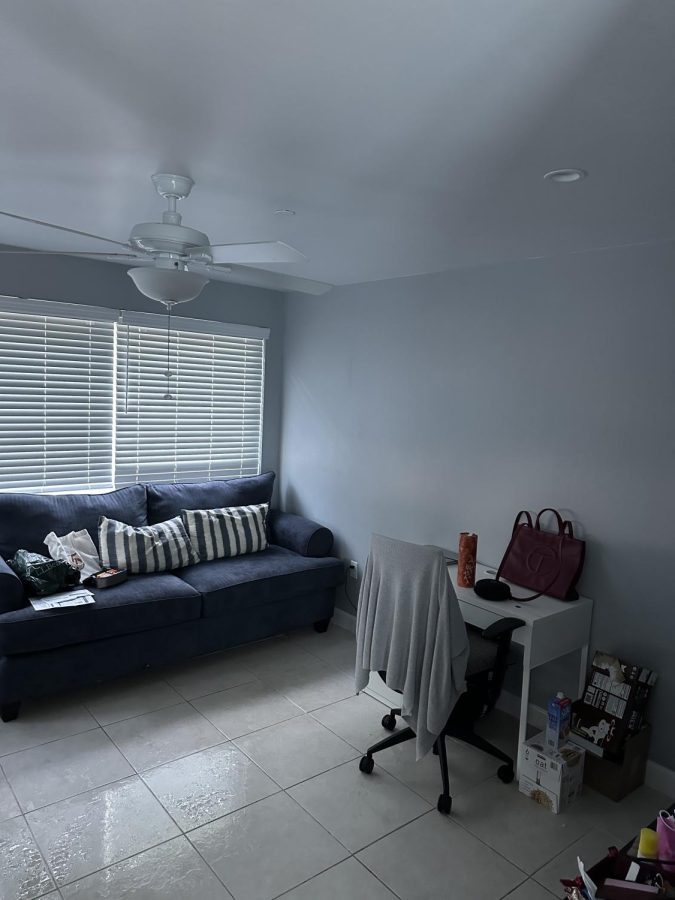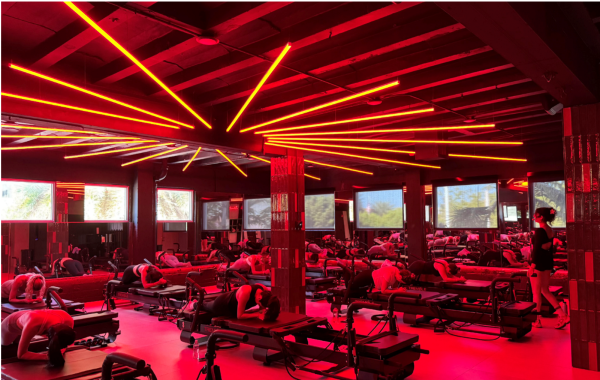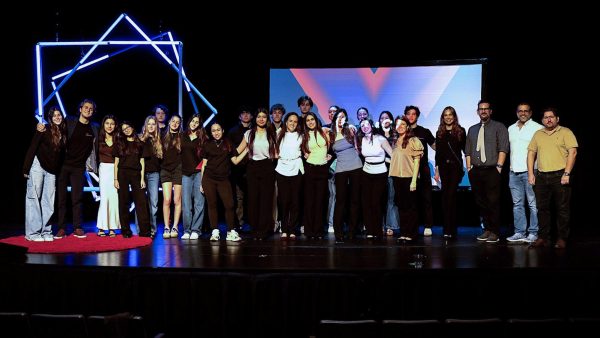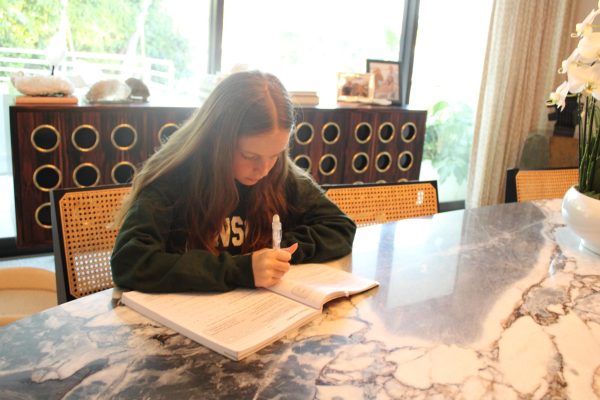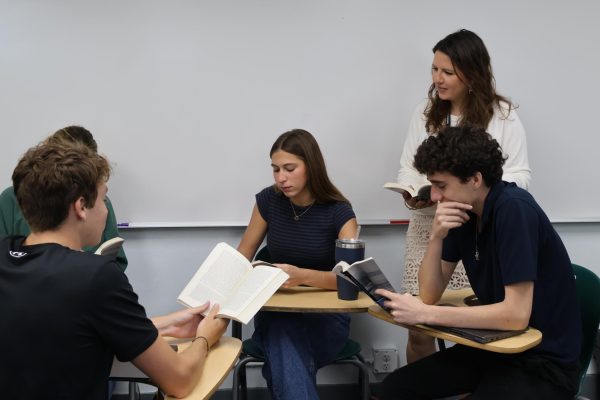Work from Home
What it’s like to live on campus at Ransom Everglades
A peek into the apartment behind Lewis Family Auditorium.
In the post-COVID era, working from home has become the norm. Now imagine that your home was at work. The workday never truly ends for the educators who live on campus. Three Ransom Everglades faculty members live with a blurred distinction between their personal and professional lives. They face the unique difficulties of juggling both lives on campus, while also appreciating the benefits.
When his wife, a pediatric cardiologist, was assigned her senior fellowship in Texas in the spring of 2022, Mr. Solomun was offered the La Brisa apartment for the year to continue in his role as Upper School Dean of Students and Water Polo coach.
After a year of living in the apartment, he still doesn’t feel 100% used to it. “It’s somewhat strange,” he said, “but it definitely has its perks.” He spends an average of 10 to 11 hours on campus every day, never retreating to the La Brisa apartment on a workday before 8 pm.
Roommates and teaching fellows, Ms. Teagan Thompson and Ms. Kelley Frumer, joined the Ransom Everglades community this year. The two share an apartment in the back of the auditorium. Somedays, they hear the jazz band practicing for a performance.
Growing up in New York and attending boarding school in Massachusetts, Ms. Thompson said she’s always had a desire to become a teaching fellow. She applied to teach at RE, in hopes for a warmer climate and change of scenery. Living on campus is “a true blessing,” she said.
Ms. Frumer also applied to RE in search of warmer weather. Last March, she woke up to her car locks frozen shut and immediately started googling ‘elementary school Key West.’ Her search for teaching opportunities led her to Ransom Everglades.
Ms. Frumer grew up attending independent schools and values smaller class sizes. “I really believe in the relationships you can build with your teachers and coaches,” she said. While a residential assistant at a program for young adults with developmental and intellectual disabilities, she cherished her in-depth involvement with the kids. Living on campus opened the opportunity to be a part of multiple programs. “I get to teach PE, I teach econ, I coach middle school sailing, I’m an advisor, I’m getting involved with clubs,” she said.
Around the corner from the security hut lies the entrance to the teaching fellow apartment: two steel school doors. Inside, the walls are a cloudy gray, and the blinds are closed, hiding their personal space from the wandering eyes of students. “Sometimes people are like ‘oh, what door is this?’ and they’re knocking… that part is a little awkward,” Ms. Frumer said.
Ms. Frumer and Ms. Thompson share a kitchen and living room/office area on the first floor. Chocolate milk cartons, boxes of animal crackers, and Goldfish crackers sit in the kitchen, awaiting to be gifted to students for classroom celebrations.
The rodent cage perched on Ms. Frumer’s desk symbolizes the relationships she has built with her students. “Shoutout to period 6,” Ms. Thompson said—the class that unexpectedly gifted Ms. Frumer a gerbil for her birthday. His name is ‘Gerbo’, and his pastimes are napping and “making a lot of noise in the night [running] on the wheel.” He loves snoozing in the large seashells that Ms. Frumer collects along the beaches of Biscayne Bay with her students. Her desk is flowered with all sorts of nature formations: seashells, rat and fish skulls, bird beaks, multiple horseshoe crabs, feathers from the Grove, shiny beetles, a twirly vine, unique leaves, a drawer of vibrant blue, dried butterflies. Ms. Frumer said these collections are her “favorite form of artwork.”
Upstairs, each roommate has their own “spacious” room. Ms. Thompson compared it to her old college dorm. Ms. Frumer’s room houses her green-eyed cat, “Mouse,” who stays upstairs due to Ms. Thompson’s allergies, unless the “faulty” smoke alarm goes off, in which case Ms. Frumer rushes back to the apartment and saves him from the deafening sounds. She claims to like Mouse “a little better” than Gerbo.
No commute and no rent are the expected advantages of living on campus, but there are unexpected ones, too. Mr. Solomun finds himself appreciating the opportunity to attend every RE hosted event. “Luckily there’s always something on campus,” he said. To busy himself after water polo practice, but before returning home, he attends every athletic game, musical performance and art show possible. He’s grateful to form a deeper connection with the RE community, and students love having him attend their games. Carolina Font ’24 said, “It’s really great to see how dedicated he is and how much he cares about us students.”
Ms. Frumer feels more comfortable living on campus, where she is surrounded by familiar people. “I’m not from here. I have no family here. I don’t know anyone here. [If] I lived in an apartment by myself, and something went wrong, it would be scary,” she said.
Although they’ve never used the auditorium as a personal movie theater, they have definitely heard every band practice. “We can hear it so vividly because the walls are so thin,” Ms. Thompson comments on Cinderella rehearsals.
Some restrictions arise for these faculty members. They can scan into the La Brisa entrance gate any time of day, and there’s no curfew for the gates closing, but there is a stricter procedure for guests. “If we have any guests, they have to sign in with the security guard at the front and they have to take a picture of their ID or their license until they check out,” said Ms. Thompson.
Sometimes, the little things can be awkward. “After a day of work, you go home, and then you’re just still here,” Ms. Frumer said. The two teaching fellows developed a habit of letting the recycling pile up, and then, after most students have left campus, driving their trash around to the cafeteria. “I don’t want to be walking out the recycling cans like, ‘Hey guys, what’s up?’ It’s awkward! ‘Oh, just throwing out my rags!’”
Ms. Thompson has found herself enjoying the location of her new home in the heart of Coconut Grove. She’s able to explore Miami and has a range of food options. But it’s not always easy. Ms. Thompson finds it hard to get off campus, because most of her life is at the Upper School. Balancing both lives is difficult. “It’s really important that I have time where I’m free to escape,” she said. At the beginning of the year, she found herself trying to navigate the distinction between personal and work life, but now feels comfortable with her boundaries.
Mr. Solomun has also created boundaries. He doesn’t like stopping by his apartment if he forgets something, because he doesn’t want home to start feeling like school, or vice versa. He tries to get out of the apartment early and return late after a productive day.
Of course, living and teaching on the same campus isn’t entirely unheard of. Ms. Morgan, an English teacher new to RE this year, has lived in boarding school apartments and campus houses her entire life. She lived and worked at a boarding school, where she resided twenty feet from her classroom. At the American Embassy School in New Delhi, she lived six years on campus, 300 meters from her classroom. “It was really kind of normal for me,” she said.
“I loved it because I am traditionally someone who is really involved at my school, so that proximity made it really easy. Especially in the boarding school world, it’s tricky because you’re basically on for 10 months straight. You have weekend, [nighttime, and] weekday duties,” she explained.
Instead of adapting to living on campus like the teaching fellows and Mr. Solomun, Ms. Morgan and her family have adapted to living off campus.
“I don’t feel like [living on campus] makes you work-obsessed, because the nature of the beast that is teaching is that we’re already work obsessed. I advocate for it,” she said.


